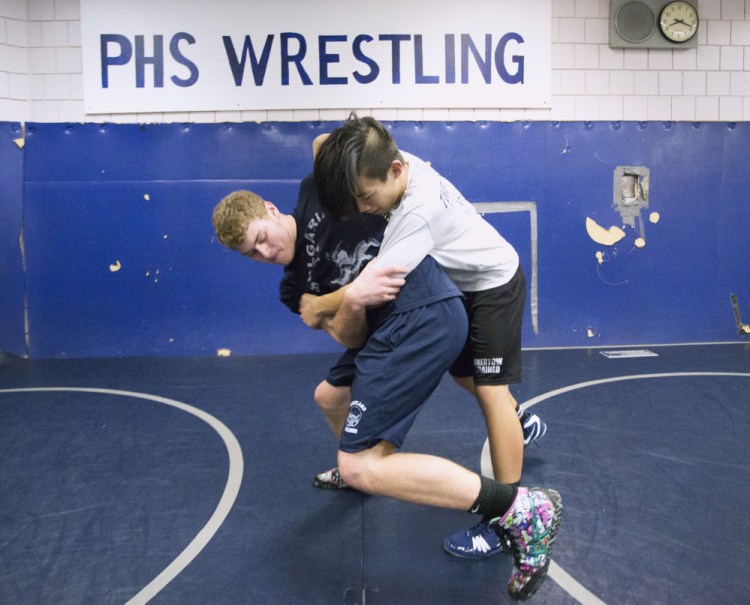If there’s a common bond among the top high school wrestling programs in Maine, it’s that they are based in communities with strong feeder programs.
No longer can a high school wrestling team excel without the benefits of a youth program that funnels into middle school teams and then the varsity level.
“If you look at who is good year after year, you can bet they have a strong feeder program,” said Kip DeVoll, now in his 34th season as head coach at Noble High – traditionally one of the state’s top schools in the sport.
DeVoll said he started to field competitive squads in the mid-1990s. It was no coincidence that a few years earlier, the Lebanon and Berwick youth wrestling programs were launched. At their peak, the two squads combined for close to 200 kids. Today, there are about 100 youth wrestlers – still making for one of the bigger feeders in southern Maine.
“Once the feeder programs began, that is when it took off for us,” DeVoll said. “(Most) of our kids come from feeder programs. It makes a big difference.”
Tony Napolitano, coach at Portland High, said establishing a feeder program can even the playing field in high school wrestling. Portland Youth Wrestling – which is still in its nascent stage at 6 years old – has had participants go on to Portland, Deering and Cheverus.
“Having that feeder program is what we need if we want to be competitive with the best teams in the state who have had a feeder program for years,” Napolitano said.
Most communities with a youth program will offer coaching, tournaments and clinics for grades K-6. Youth wrestling programs have been launched recently in Sanford, Biddeford (both three years ago) and Scarborough (two years ago).
“Without a feeder program, it is hard to maintain a high school program because you won’t have the numbers,” said Biddeford Coach Steve Vermette. “If a kid starts in fifth or sixth grade and gets involved slowly, they are likely to wrestle in high school.”

Kyle Glidden, the Class A champion in the 113-pound division last winter, is one of the top returnees for Marshwood, which had a streak of four consecutive state titles snapped by Skowhegan. Jill Brady/Staff Photographer
One benefit of feeder programs is that they allow high school teams to fill more weight classes – often a problem for schools in Maine. Another advantage, obviously, is the first day of practice is not marked by athletes who have never stepped on a wrestling mat.
Many of the youth coaches are former wrestlers or assistant coaches at the high school level who can impart philosophies similar to the head coach.
“One thing we made sure we did is (that) peewee and middle school coaches are teaching the same things and concepts I focus on in high school,” said Mt. Ararat/Brunswick Coach Erick Jensen. “I am then able to refine kids. It takes days instead of weeks. I then can work on positioning and techniques sooner. That’s a huge advantage.”
Many high school coaches look beyond wins and losses, and even state championships, when talking about the benefits of feeder programs. It gets kids involved early and often teaches them life lessons, before winning matches becomes a greater emphasis.
Marshwood Coach Matt Rix has first-hand experience of what wrestling can do for an individual. His four children wrestled or were involved with his team. His daughter, Deanna, trains with the women’s national team in Colorado Springs, Colorado.
“Wrestling is a lot like life,” Rix said. “Kids may get beaten down but get back up and try again. They may never get to varsity or win a state championship … but some of them are very successful (in life) and credit the time they put in on the mat.”
There are scores of high school wrestlers in southern Maine who began in youth programs. Several will vie for state championships, including Zach Elowitch and Ben Levine of Portland; Sam Anderson of Sanford; Matt Carroll and Leo Amabile of Massabesic; and Cody Mains, Caleb Frost, Tyler Fitz and Joe Kenny of Bonny Eagle.
“More than anything else, we want to spread the culture of wrestling,” said Deron Sharp, Scarborough’s second-year coach. “We know what a great tool it is for life.”
Send questions/comments to the editors.



Success. Please wait for the page to reload. If the page does not reload within 5 seconds, please refresh the page.
Enter your email and password to access comments.
Hi, to comment on stories you must . This profile is in addition to your subscription and website login.
Already have a commenting profile? .
Invalid username/password.
Please check your email to confirm and complete your registration.
Only subscribers are eligible to post comments. Please subscribe or login first for digital access. Here’s why.
Use the form below to reset your password. When you've submitted your account email, we will send an email with a reset code.